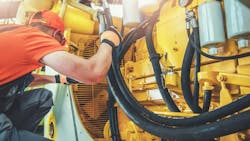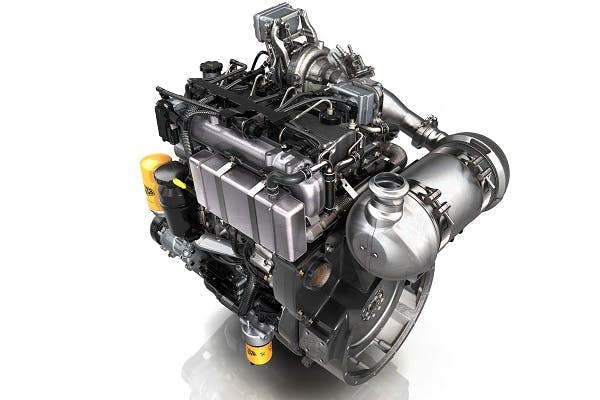Key Maintenance Considerations for Running Renewables
As managers of fleets of construction equipment and trucks navigate pressures for reduced emissions and improved fuel efficiency, many are opting for renewable fuels. As fuel use increases, so must a focus on proper maintenance of engines.
“Petroleum-based fuels have been the industry standard for years, especially for heavy-duty off-highway applications like those found in the construction industry, due to their cost-effectiveness and reliability,” says Craig Lohmann, renewable fuels engineering manager at John Deere Power Systems. “However, changing environmental regulations around the globe are driving research and investment in alternative fuels, helping them to become more widely adopted and readily available.”
Biodiesel, Lohmann says, offers a promising path forward for the heavy equipment industry because of its availability and ease of integration.
The alternative fuel, made from natural sources like vegetable oils and animal fats, can be mixed with regular diesel in various amounts to create different blends like B5 (5% biodiesel and 95% diesel), B20 (20% biodiesel), and B100 (pure biodiesel.
“One of the main benefits of biodiesel over regular diesel is the reduced emissions and air pollution,” says Lohmann. “Because it's made from resources that can be grown locally, biodiesel helps reduce our need for imported oil and promotes sustainable energy practices.”
There are notable differences between biodiesel and renewable diesel, according to Lohmann. Both are made from vegetable oils and fats, but renewable diesel is chemically altered with hydrogen to remove the oxygen and make it chemically similar to fossil diesel. Therefore, renewable diesel can be handled like fossil diesel while biodiesel requires specific handling and storage practices.
Many engine manufacturers are modifying conventional diesel engines to work with biodiesel and other alternative fuels, facilitating the shift to sustainable power and lowering costs associated with other power solutions such as battery electricity.
One of those manufacturers is JCB, which has approved the use of HVO (hydro-treated vegetable oil) fuel as a diesel fuel alternative in JCB 444 and 448, stage IIB and stage IV engines, according to its machine owner’s manual. The JCB 444/448 engines can also be operated on GVO or ‘synthetic’ fuels.
Although the use of HVO’s has been approved in this set of JCB engines for some time, “five years ago they got really popular as people tried to branch out and get away from high diesel prices” said Lee Tice, product manager JCB.
How to maintain engines with renewable fuels
Here are some maintenance processes that can help maintain the quality of fuel and the life of the machines.
- Fuel quality: Maintaining fuel quality is crucial when using biodiesel specifically, according to Deere’s Lohmann. Poor-quality biodiesel can contain contaminants, water, or oxidation products, leading to engine deposits, corrosion, and poor performance. Managers should ensure they use biodiesel from reputable providers that adhere to quality standards like ASTM D6751 in the U.S. and Canada. If a high-quality HVO that adheres to national and local quality standards is not used, Tice says, users can expect higher frequency of maintenance.
- Fuel filter intervals: Renewable fuels have unique properties that can impact engine performance, especially related to clogging of fuel filters. Regularly monitoring and changing fuel filters ensures a consistent flow of clean fuel, efficient operation, and , prevents unexpected downtime, according to Lohmann. With JCB machines, lack of attention to filters can lead to more frequent maintenance to sensors, EGR valves, and other components, says Tice.
- Proper storage of fuels: Biodiesel specifically should be stored in clean, dry, and temperature-controlled environments to prevent degradation. Fuel tanks should be regularly cleaned, and fuel should be used within a certain time to avoid issues related to long-term storage, such as microbial growth.
About the Author
Harlee Hewitt
Harlee is a former associate editor for Construction Equipment.

